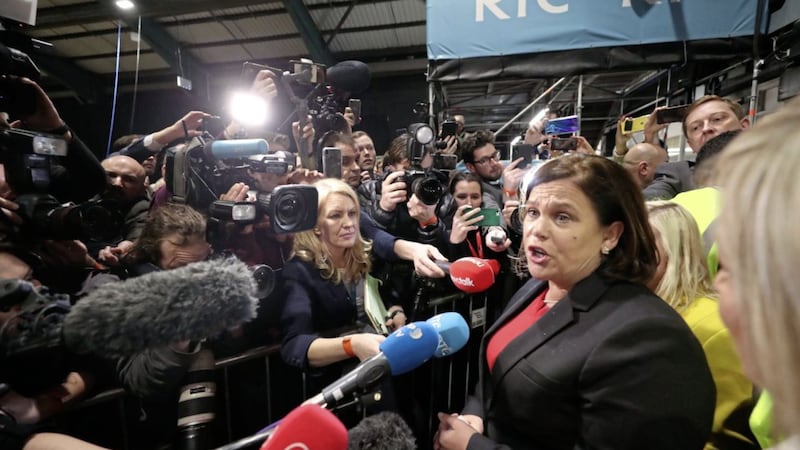Sinn Féin has a circle to square in Dublin.
A united Ireland is the party’s reason to be, yet almost none of its 240,000 new supporters backed it for that reason. Like most people in the Republic, these voters have a general aspiration for unification but their priorities are housing and healthcare.
Sinn Féin has nothing to gain by confronting them with the details of what unity might involve and risks losing their support if this is seen to be distracting from bread and butter delivery.
There is a danger Sinn Féin is going to square this circle with stunt politics, starting arguments about unification that keep the pot boiling without requiring any of the challenges to be addressed. That was certainly the impression leader Mary Lou McDonald gave in an interview with BBC Newsnight on Monday.
Until two weeks ago, McDonald was describing preparations for unity and a border poll within five years as an “absolute necessity” for entering coalition talks. Last week, once it was clear Sinn Féin was heading for power, she said: “I have not posited the border poll and the preparations for it as a red line.”
That squared half the circle. Sinn Féin has no intention of getting bogged down in the controversial nitty gritty of planning for a united Ireland while in office. McDonald says preparations are still essential and a poll will still happen but she has stopped mentioning the five year time frame that turned aspiration to urgency, which would be fair enough if that was the end of the matter. However, nobody in Sinn Féin is saying they have no mandate to prioritise unification.
Instead, McDonald told Newsnight that in office she will press UK prime minister Boris Johnson to prepare for unification and a border poll and press the EU to “take a stand” for Irish unity, citing bogus parallels with Cyprus and Germany.
Both calls are non-starters, suggesting London and Brussels should step outside the terms of the Good Friday Agreement.
Yet there is cynical method to this obvious mischief-making.
Demanding the British government prepare for unity and a border poll shifts the blame for Sinn Féin inaction and sets up a victim posture. It echoes SNP tactics on a second Scottish independence referendum and paints a picture of Johnson denying a democratic vote to Scotland and Northern Ireland - a comparison immediately made by commentators in Britain.
Making similar calls to Brussels knocks this up a gear. The Irish government has a crucial role in the Brexit management committees that will decide unique arrangements for Northern Ireland. The EU is not going to back a territorial claim on a friendly-ish neighbour but it could be bounced into making anodyne statements that Sinn Féin could spin as a great victory. In reality, this would be a great distraction from doing nothing concrete about unity or indeed the management of Brexit.
These tactics are aimed at southern voters rather than unionists but much of their success will depend on unionist reaction.
If the response is defensive and petulant, it will play into Sinn Féin’s hands. Empty agitation requires agitees.
So far, in these very early days, the DUP and the UUP appear wise to the trap. Both parties have said nothing has changed as regards the mechanics and numbers on unification, which is strictly correct. However, both already sound a little strangulated, with signs of backbench disquiet.
Even if unionists can hold a business-as-usual line, that is only half of what needs to be done. The fact is that Sinn Féin in government will be a huge change for politics north and south. If republicans have free rein on their new platform to grandstand over unification it will inevitably unsettle relationships at Stormont and across Northern Ireland as a whole.
To complete their response, unionists need to revisit Peter Robinson’s 2018 advice on preparing for a possible united Ireland. The former DUP leader described this as an insurance policy against a border poll. The same insurance must also be considered against Sinn Féin in power in Dublin.
Republicans should not be left to discuss unification in terms of fluffy generalities and the responsibilities of others. They should know that difficult specifics will be raised, including their own responsibilities in government.
Unionists need not fear this would drag them into negotiating their own demise. They need only join the conversation with as much cynicism as Sinn Féin itself.









